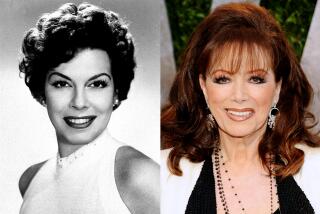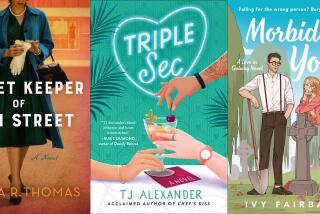Life’s full participant
BERKELEY — Growing old has a way of sneaking up on people, of leaving them behind as vital participants in life’s passages. But Jane Juska, an astute observer of life’s changes, wasn’t going to let that happen to her.
Juska, a former high school English teacher, felt tripped up by the aging process. Though retired, her juices were still flowing and, more important, she felt like a young person trapped in an aged body. “I didn’t want to grow old never sleeping with a man again,” she confides, admitting at the same time that she hadn’t seen a naked male body in more than 10 years.
Unfazed by practical considerations, Juska did what any ripe and ready person might do: She took out a personals ad declaring her availability. She chose as her venue the well-regarded New York Review of Books. She fielded responses, and she met men.
Her rousing memoir recounting her experiences, “A Round-Heeled Woman: My Late-Life Adventures in Sex and Romance,” is stirring up interest in every nook and cranny where boomers are quietly aging. And it looks as though Juska may end up a heroine not just to herself but to myriad older women -- and men -- who suppress desire in the name of propriety and accept society’s view that growing older is if not ugly then unseemly and best done out of the public view.
Despite her systematic search for partners, and her public airing of same, first-time author Juska professes no interest in being a spokeswoman for senior sex or its pleasures. If you seek her advice, she deflects it. “I think you should ask someone else,” she tells an older woman who has asked whether she should sleep with a man she has known for only a week. “I’m alone at home watching ‘Law and Order.’ ”
A 32-year-old writer from the online journal Salon asks on behalf of her mother, a linguistics professor, whether a personals ad is a good idea. “The NYRB worked for me,” she replies. Indeed, she got 63 responses to her posting.
Juska turned 70 in March. She didn’t set out to flaunt her bold adventures in print, though she shows real talent in describing her foray into the world of first dates and first kisses and caresses that go all the way. The book is unabashed in its honesty, forthright about her experiences, probing, funny and sad. It doesn’t take many pages to get the reader rooting for her, hoping she finds someone who will appreciate her.
Young writers plow this territory, but who dares do it when they are past their prime, when intimations of mortality are all about and, worse, “what once was firm is loose, what once went up goes down”?
Editor Susanna Porter, who bought the book for Random House’s Villard imprint, says Juska’s first draft had terribly unflattering physical descriptions, which got softened in the editing process. “Jane looks like a woman who looks her age but she is really good-looking,” Porter says. “I thought the descriptions were too brutal. It was better to leave it to the reader’s imagination.”
Assistance from Trollope
Why did Juska want to sleep around? And why did she go public in “A Round-Heeled Woman”? Juska, who married and divorced early in life and raised a son on her own, discovered, after retiring from 33 years of high school teaching, that she no longer felt touched by the world, was no longer part of its sexual dynamics, and she missed it.
“Retirement is a terribly serious step for anybody,” she says. “There’s high drama in high school. It takes all your energy and passion and then asks for more. So when that’s over, it’s like a death. So what are you going to do?”
Spurred on by the Eric Rohmer film “Autumn Tale,” in which a mature woman advertises for a man for her friend, Juska concocted an ad (“Before I turn 67-- next March -- I would like to have a lot of sex with a man I like. If you want to talk first, Trollope works for me”), placed it in a publication noted for its relentless intellectualism and set in motion a saga that, from all outward signs, has only just begun.
Just a few weeks after publication, the book is in its fourth printing. At one point, it jumped to No. 15 in the Amazon sales ranking. There’s interest in doing a stage adaptation, and a couple of TV producers are sniffing around the rights.
“There’s a lot of excitement out there in Hollywood,” says Juska’s literary agent, Virginia Barber, at the William Morris Agency in New York, where a young assistant found the book in the slush pile, that vast, never-ending influx of unsolicited book submissions. “We don’t yet have the offer we want.” A big fan of the author, Barber says, “No one opened the door for her. She did it with cleverness and wit.”
Of the men Juska met, she is still in active relationships with at least three, including half-her-age Graham, an “old soul in a young body” who offered her great sex and wonderful companionship.
At Cody’s Bookstore in Berkeley, where Juska did a reading and signed books, a woman whispered to her, “Do you still see Graham?”
“I told her yes,” Juska says. “It made her day. I guess I would have said yes even if it wasn’t true.” Young Graham is a very romantic part of the story.
Since the flurry of media attention, another wave of letters from suitors has come in, but the author says she’s “not taking on anyone new.” A man from Roslyn, N.Y., got in touch, saying he wasn’t fond of being taken care of or taking care of. Juska wrote back, “I could really use a person who irons.”
The author -- white hair, blue eyes, bare of makeup and shoes, with a suppleness to her gestures that makes the age question irrelevant -- is comfortably draped on a cushy white couch in the small living room of her tiny Berkeley cottage, remembering one of her first assignations. It was a leisurely weekend in a romantic setting with Jonah, eightysomething (all names and professions were assiduously changed in the book).
The meeting didn’t end well, and to top it off, Juska discovered the champagne flutes she had brought along for their sybaritic enjoyment were missing, as well as a pair of silk pajama shorts. And so the book was born. “When the guy stole my underpants at the Claremont Hotel, I knew I would have to write about it all,” she says. The notes she had been jotting down “for the record” were hammered into a full-fledged story.
To set the record straight, the book is not all about sex; it’s not even mostly about sex. There are nine pages devoted to finding a way into the Berg collection at the New York Public Library to see the manuscript of Anthony Trollope’s novel “Miss MacKenzie” (it made her weep), and much about her Ohio childhood, her father the doctor, her disastrous marriage, her periods of self-loathing, her wayward son who finally builds himself a good life, her inmate students in the writing class she now teaches at San Quentin prison.
‘I have been hungry’
One of her men, John, who resurfaced when the book appeared -- not dead of colon cancer as she had feared, ill as he was at their last meeting -- was enamored of the 19th century intellectual and writer Margaret Fuller. When Juska writes, “People like this must not go unattended; they are rare and getting rarer. I have been hungry for people like John for so long, people who would talk to me about what I hold near and dear,” it’s clear that her search was broader and wider than she let on in the beginning.
“Participating in art and in sex allows us to transcend the certainty of our own death and the destruction of all that is beautiful and good,” she writes. “Art compensates for life.”
At the reading here, someone asked how it was possible for her to sleep with strangers. “The audience was, by this time, with me,” Juska says. “And they shouted out, ‘She didn’t sleep with strangers.’ This book is making a lot of people smile. I’m happy about that. It’s funny. It has a happy ending.”
The real-life ending is happy too. With a new book in progress and another one beginning to coalesce, she rejoices that she has a writing life ahead of her, no matter what happens to her social calendar.
Sitting in her tiny cottage, surrounded by a lively selection of reading matter that includes Nancy Milford’s “Savage Beauty” and Michel Faber’s “The Crimson Petal and the White,” Juska says that a washing machine has become a huge symbol to her.
“If I get enough money for a washing machine, I’ll have to find a place to put it. I’ll have to move. A little hint of money and already I’m beginning to think about what I want. People ask me if my life has changed. Right now I say I still go to the Laundromat.”
More to Read
Sign up for our Book Club newsletter
Get the latest news, events and more from the Los Angeles Times Book Club, and help us get L.A. reading and talking.
You may occasionally receive promotional content from the Los Angeles Times.








